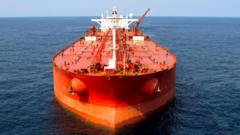Oil prices surged sharply after Israel's military operation against Iran, impacting global markets. Investors are wary of supply disruptions from this energy-rich region, triggering a notable increase in crude prices.
Brent crude shot up over 10%, reaching heights not seen since January. Although prices later stabilized, they remained approximately 5% higher than the previous day's close, trading at around $74.47 per barrel. Current prices still sit below last year’s levels and far from the early 2022 highs following geopolitical tensions stemming from Russia's invasion of Ukraine.
Stock markets across Asia and Europe reacted negatively, with Japan's Nikkei down by 0.9% and the UK's FTSE 100 declining by 0.3%. The trend continued in the US market, where the Dow Jones faced a 1.5% drop, and the S&P 500 fell by 0.8%. Investors shifted towards "safe haven" assets like gold and the Swiss franc during this period of heightened uncertainty, pushing gold prices to their highest point in nearly two months.
Following the Israeli airstrikes, Iran purportedly launched around 100 drones in retaliation. Analysts suggest the situation is volatile, with potential for an escalation that could significantly disrupt oil supplies, particularly if Iran targets oil production facilities. If this were to occur, predictions indicate a potential spike of Brent crude prices to $80-$100 per barrel.
However, any substantial price increase may be moderated by an increased output from other oil providers aimed at stabilizing the market. The UK's RAC motoring body noted that it is still early to predict the impact of higher oil prices on petrol costs, with crucial factors being the duration of elevated wholesale prices and decisions by retailers on their margins.
Iran's capabilities pose a significant risk to global oil supply, particularly through the crucial shipping lane of the Strait of Hormuz, through which approximately 20% of the world’s oil is transported. With dozens of tankers navigating this vital route at any time, tensions in the region could lead to severe disruptions in oil supply chains.
Energy traders are expected to closely monitor the unfolding situation in the coming days, balancing their responses to any escalation of conflict. Observers are on edge regarding whether the scenario could lead to a more extensive conflict impacting oil supply throughout the Middle East.
Brent crude shot up over 10%, reaching heights not seen since January. Although prices later stabilized, they remained approximately 5% higher than the previous day's close, trading at around $74.47 per barrel. Current prices still sit below last year’s levels and far from the early 2022 highs following geopolitical tensions stemming from Russia's invasion of Ukraine.
Stock markets across Asia and Europe reacted negatively, with Japan's Nikkei down by 0.9% and the UK's FTSE 100 declining by 0.3%. The trend continued in the US market, where the Dow Jones faced a 1.5% drop, and the S&P 500 fell by 0.8%. Investors shifted towards "safe haven" assets like gold and the Swiss franc during this period of heightened uncertainty, pushing gold prices to their highest point in nearly two months.
Following the Israeli airstrikes, Iran purportedly launched around 100 drones in retaliation. Analysts suggest the situation is volatile, with potential for an escalation that could significantly disrupt oil supplies, particularly if Iran targets oil production facilities. If this were to occur, predictions indicate a potential spike of Brent crude prices to $80-$100 per barrel.
However, any substantial price increase may be moderated by an increased output from other oil providers aimed at stabilizing the market. The UK's RAC motoring body noted that it is still early to predict the impact of higher oil prices on petrol costs, with crucial factors being the duration of elevated wholesale prices and decisions by retailers on their margins.
Iran's capabilities pose a significant risk to global oil supply, particularly through the crucial shipping lane of the Strait of Hormuz, through which approximately 20% of the world’s oil is transported. With dozens of tankers navigating this vital route at any time, tensions in the region could lead to severe disruptions in oil supply chains.
Energy traders are expected to closely monitor the unfolding situation in the coming days, balancing their responses to any escalation of conflict. Observers are on edge regarding whether the scenario could lead to a more extensive conflict impacting oil supply throughout the Middle East.


















